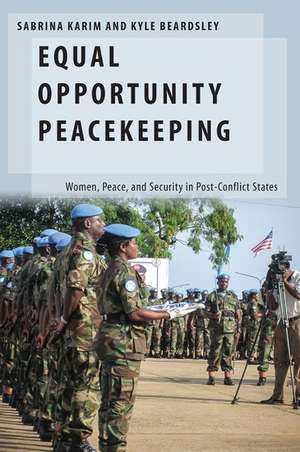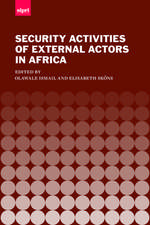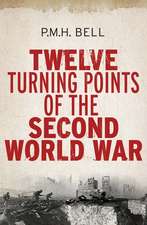Equal Opportunity Peacekeeping: Women, Peace, and Security in Post-Conflict States: Oxford Studies in Gender and International Relations
Autor Sabrina Karim, Kyle Beardsleyen Limba Engleză Paperback – 25 oct 2019
| Toate formatele și edițiile | Preț | Express |
|---|---|---|
| Paperback (1) | 215.78 lei 31-37 zile | |
| Oxford University Press – 25 oct 2019 | 215.78 lei 31-37 zile | |
| Hardback (1) | 570.43 lei 31-37 zile | |
| Oxford University Press – 4 mai 2017 | 570.43 lei 31-37 zile |
Din seria Oxford Studies in Gender and International Relations
- 27%
 Preț: 370.37 lei
Preț: 370.37 lei - 23%
 Preț: 453.86 lei
Preț: 453.86 lei - 19%
 Preț: 617.59 lei
Preț: 617.59 lei - 14%
 Preț: 199.10 lei
Preț: 199.10 lei - 24%
 Preț: 370.87 lei
Preț: 370.87 lei - 27%
 Preț: 426.14 lei
Preț: 426.14 lei - 7%
 Preț: 216.34 lei
Preț: 216.34 lei - 16%
 Preț: 491.33 lei
Preț: 491.33 lei -
 Preț: 235.79 lei
Preț: 235.79 lei - 19%
 Preț: 127.24 lei
Preț: 127.24 lei - 19%
 Preț: 177.77 lei
Preț: 177.77 lei -
 Preț: 258.50 lei
Preț: 258.50 lei - 10%
 Preț: 439.09 lei
Preț: 439.09 lei - 9%
 Preț: 480.59 lei
Preț: 480.59 lei - 18%
 Preț: 345.75 lei
Preț: 345.75 lei - 13%
 Preț: 135.12 lei
Preț: 135.12 lei - 27%
 Preț: 402.03 lei
Preț: 402.03 lei - 15%
 Preț: 277.35 lei
Preț: 277.35 lei - 19%
 Preț: 198.22 lei
Preț: 198.22 lei -
 Preț: 287.11 lei
Preț: 287.11 lei - 14%
 Preț: 278.91 lei
Preț: 278.91 lei -
 Preț: 265.32 lei
Preț: 265.32 lei - 26%
 Preț: 582.53 lei
Preț: 582.53 lei - 14%
 Preț: 177.77 lei
Preț: 177.77 lei - 20%
 Preț: 279.41 lei
Preț: 279.41 lei - 30%
 Preț: 612.43 lei
Preț: 612.43 lei - 23%
 Preț: 183.17 lei
Preț: 183.17 lei - 30%
 Preț: 492.40 lei
Preț: 492.40 lei - 11%
 Preț: 222.30 lei
Preț: 222.30 lei - 18%
 Preț: 225.04 lei
Preț: 225.04 lei - 30%
 Preț: 552.22 lei
Preț: 552.22 lei - 30%
 Preț: 494.84 lei
Preț: 494.84 lei - 30%
 Preț: 491.59 lei
Preț: 491.59 lei - 30%
 Preț: 581.39 lei
Preț: 581.39 lei - 30%
 Preț: 521.67 lei
Preț: 521.67 lei - 23%
 Preț: 163.62 lei
Preț: 163.62 lei - 30%
 Preț: 548.28 lei
Preț: 548.28 lei - 11%
 Preț: 400.01 lei
Preț: 400.01 lei
Preț: 215.78 lei
Preț vechi: 245.84 lei
-12% Nou
Puncte Express: 324
Preț estimativ în valută:
41.29€ • 43.23$ • 34.16£
41.29€ • 43.23$ • 34.16£
Carte tipărită la comandă
Livrare economică 25-31 martie
Preluare comenzi: 021 569.72.76
Specificații
ISBN-13: 9780190093532
ISBN-10: 0190093536
Pagini: 296
Dimensiuni: 231 x 155 x 20 mm
Greutate: 0.41 kg
Editura: Oxford University Press
Colecția OUP USA
Seria Oxford Studies in Gender and International Relations
Locul publicării:New York, United States
ISBN-10: 0190093536
Pagini: 296
Dimensiuni: 231 x 155 x 20 mm
Greutate: 0.41 kg
Editura: Oxford University Press
Colecția OUP USA
Seria Oxford Studies in Gender and International Relations
Locul publicării:New York, United States
Recenzii
Equal Opportunity Peacekeeping has laid valuable grounds for showing that peacekeeping organizations are profoundly gender biased a highly interesting contribution to our understanding of the global power structures that are embodied in peacekeeping.
Equal opportunity peacekeeping presents a systematic and thorough overview of relevant feminist scholarship, with the aim to generate 'theoretical expectations' especially regarding practices of 'female ratio balancing', where the numbers of female peacekeepers is increased.
Intended for specialists and advanced students, this book is highly recommended for university libraries and specialized collections on international affairs and security studies. Highly recommended." -CHOICE
Very few studies have attempted to systematically explore the implementation of policies linking gender equality to peace processes and peace operations. Beardsley and Karim's book is a path-breaking study of gender equality in peacekeeping missions. Triangulating data from UN missions-both military and police-with very rich material based on interviews, field experiments and surveys from UNMIL in Liberia, this trailblazing book becomes an essential reading for all interested in gender, security and peacekeeping missions in the 21st century." -Theodora-Ismene Gizelis, Professor, Department of Government, University of Essex
Karim and Beardsley combine methodological rigor with personal narratives from peacekeepers and civilians, providing a rich analysis of how gender inequality affects peacekeeping. This is essential reading for anyone with an interest in gender and IR, and for everyone working with peacekeeping." -Lisa Hultman, Department of Peace and Conflict Research, Uppsala University
This book offers a different story of peacekeeping, shedding an innovative light on gender reforms and women's equal opportunities by combining original data with space for local voices. In addition, it emphasizes the need for a knowledge-based approach to successfully addressing sexual exploitation and abuse; a crime and a key challenge to effective peace operations. The book is highly recommended to all those working to strengthen peace operations and to students specializing in international politics.
Karim (Cornell) and Beardsley (Duke) have given us a theoretically informed, data-driven analysis of both gender (in)equality in peacekeeping units and the sexual exploitation, abuse, harassment, and violence (SEAHV) that often accompany their deployments. Intended for specialists and advanced students, this book is highly recommended for university libraries and specialized collections on international affairs and security studies."
Equal opportunity peacekeeping presents a systematic and thorough overview of relevant feminist scholarship, with the aim to generate 'theoretical expectations' especially regarding practices of 'female ratio balancing', where the numbers of female peacekeepers is increased.
Intended for specialists and advanced students, this book is highly recommended for university libraries and specialized collections on international affairs and security studies. Highly recommended." -CHOICE
Very few studies have attempted to systematically explore the implementation of policies linking gender equality to peace processes and peace operations. Beardsley and Karim's book is a path-breaking study of gender equality in peacekeeping missions. Triangulating data from UN missions-both military and police-with very rich material based on interviews, field experiments and surveys from UNMIL in Liberia, this trailblazing book becomes an essential reading for all interested in gender, security and peacekeeping missions in the 21st century." -Theodora-Ismene Gizelis, Professor, Department of Government, University of Essex
Karim and Beardsley combine methodological rigor with personal narratives from peacekeepers and civilians, providing a rich analysis of how gender inequality affects peacekeeping. This is essential reading for anyone with an interest in gender and IR, and for everyone working with peacekeeping." -Lisa Hultman, Department of Peace and Conflict Research, Uppsala University
This book offers a different story of peacekeeping, shedding an innovative light on gender reforms and women's equal opportunities by combining original data with space for local voices. In addition, it emphasizes the need for a knowledge-based approach to successfully addressing sexual exploitation and abuse; a crime and a key challenge to effective peace operations. The book is highly recommended to all those working to strengthen peace operations and to students specializing in international politics.
Karim (Cornell) and Beardsley (Duke) have given us a theoretically informed, data-driven analysis of both gender (in)equality in peacekeeping units and the sexual exploitation, abuse, harassment, and violence (SEAHV) that often accompany their deployments. Intended for specialists and advanced students, this book is highly recommended for university libraries and specialized collections on international affairs and security studies."
Notă biografică
Sabrina Karim is an Assistant Professor in Government at Cornell University. Between 2016-2017, she was a Dartmouth Dickey Center Fellow in U.S. Foreign Policy and International Security. Her research interests include gender reforms in post-conflict security forces, the effect of security sector reforms on peace and order, the dynamics of peacekeeping missions, and the relationship between gender equality and violence.Kyle Beardsley is Associate Professor of Political Science at Duke University. He is author of The Mediation Dilemma. His research interests include third-party involvement in peace processes, the nature of intrastate rebellion, gender reforms in post-conflict security forces, and nuclear weapons.







